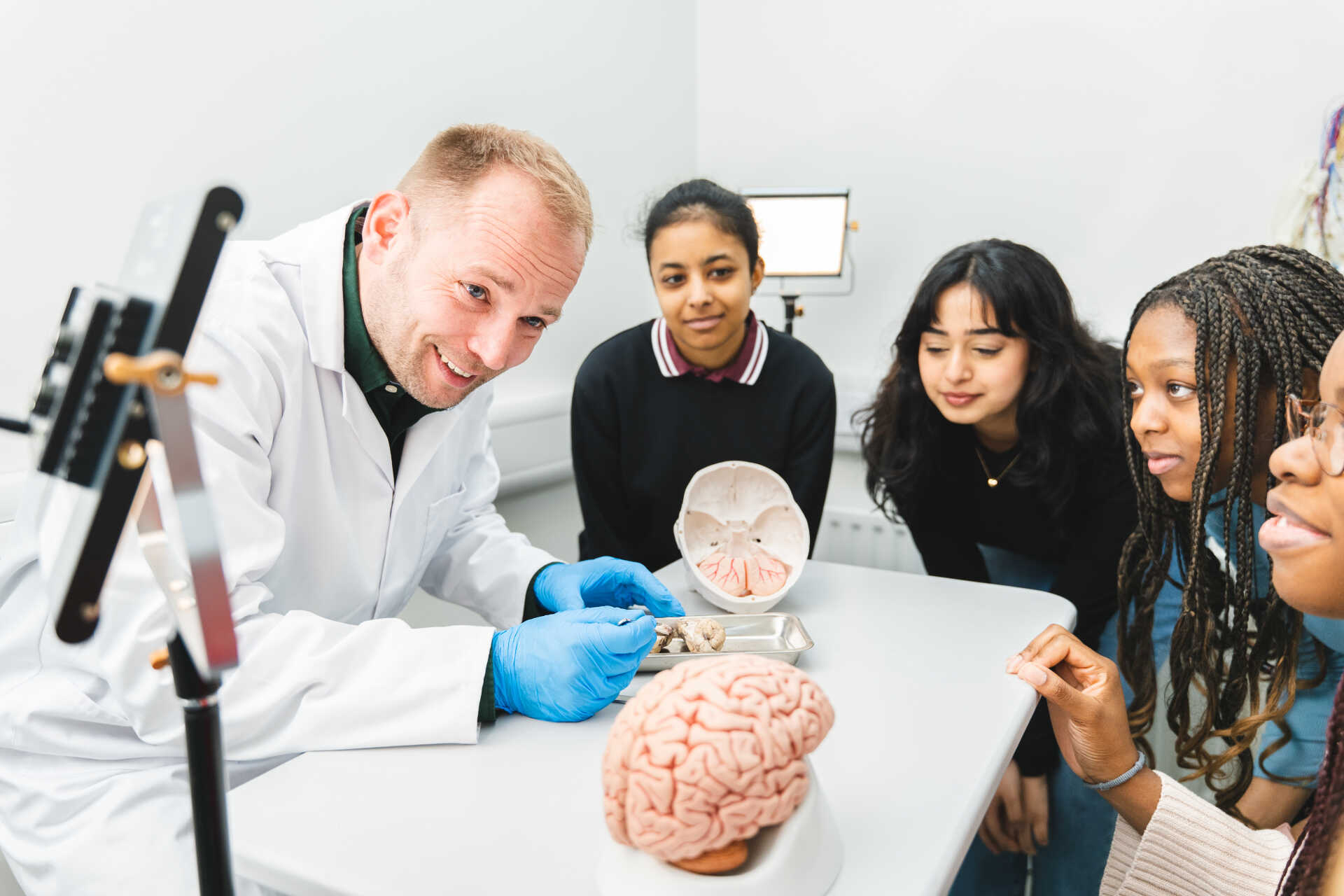What can I do with a degree in Psychology?

A degree in Psychology from the University of Kent will develop your knowledge in psychological theories and research methods, whilst equipping you with a wide range of valuable skills such as critical thinking, data analysis, communication and problem solving. This knowledge and these competencies open doors to a diverse range of careers both within and beyond psychology. Get ideas and inspiration here before booking a one-to-one appointment with a Careers Adviser.
Careers in Psychology
Clinical Psychologist - Specialise in diagnosing and treating psychological disorders, including mental health conditions such as anxiety, depression, psychosis, eating disorders and addictions, as well as learning disabilities and family/relationship issues.
Counselling Psychologist - Use psychological theory and research in therapeutic work to help clients with a range of difficult life issues or mental health conditions.
Educational Psychologist - Apply psychological theory, research and techniques to promote positive outcomes in relation to wellbeing, communication and learning.
Forensic Psychologist - Apply psychological theory to criminal investigation to help understand psychological problems associated with criminal behaviour, and the treatment of those who have committed offences.
Health Psychologist - Promote wellbeing and healthy behaviours across the population. You’ll be specially trained to understand the psychological and emotional aspects of health and illness and to bring about improvements.
Sport and Exercise Psychologist - Work with athletes and sports teams to help them improve their performance, supporting behaviours and mental processes to enable them to reach full potential. Work with the general public to increase motivation and participation in exercise, encouraging a healthy lifestyle and advising on the psychosocial benefits that exercise can offer.
Occupational Psychologist - Use an understanding of how people behave at work to improve productivity, job satisfaction and effectiveness within an organisation. Provide support on an individual or organisational basis to address issues such as performance, culture and change.
Neuropsychologist - Work with people of all ages dealing with patients who have had traumatic brain injury, strokes, toxic and metabolic disorders, tumours and neurodegenerative diseases.
Assistant Psychologist - The precise duties of an Assistant Psychologist can vary depending on the area of psychology involved, but in general they will involve tasks such as: preparing/administering psychological tests and assessments, observing and recording behavioural observations, implementing specific treatment and intervention programmes, research and information-gathering.
Psychological Wellbeing Practitioner - Treat people with a range of low-level to moderate mental health difficulties, as well as referring people for more intensive support.
Mental Health and Wellbeing Practitioner - Provide evidence-based interventions and coordinate care plans for adults with severe mental health problems. Based in the community, you do not provide psychological therapy but deliver effective wellbeing interventions to help people recover and improve their lives.
Education Mental Health Practitioner - Work across education and healthcare to provide mental health support for children and young people in schools and colleges.
Counsellor/Psychotherapist - Work with people experiencing a wide range of emotional and psychological problems, offering them time, empathy and respect to talk about issues, with the aim of increasing their ability to cope with challenges, or to make positive changes to their lives.
Alternative career paths
Human Resources Officer - The people profession has a huge variety of roles within it, from numerical and data-driven roles in reward and analytics to development roles in talent and learning and development. HR Officers ensure organisations employ the best workforce to meet its objectives, whilst supporting employees.
Market Researcher - Collect and analyse data and information to help clients make informed political, social and economic decisions.
Marketing Executive - Promote a company or an individual product or brand. This may include planning campaigns, commissioning market research and communicating with people in all areas of the business, from production to finance, as well as externally.
Social Worker - Work with people in the community who need support, for example, the elderly, children who are at risk, people with disabilities or mental health difficulties. They aim to improve people’s lives and protect children and adults with support needs from harm.
Play Therapist - Help children and young adolescents work through difficult life issues and deal with emotional distress and trauma using play as a communication tool.
Speech and Language Therapist - SLTs provide treatment, support and care for people of all ages who have difficulties with speech, language, communication, eating, drinking and swallowing. They work in all kinds of areas and settings to improve people’s quality of life.
Education and Teaching - Educating students in Psychology at various educational levels - predominantly from GCSE onwards.
Where do University of Kent graduates work?
This is a selection of organisations that have employed University of Kent graduates in the past. There are many more possible employers in these and other industries.
Health and NHS Trusts: Kent and Medway NHS and Social Care Partnership Trust, NEFLT NHS Trust, Oxleas NHS Foundation Trust and other NHS Trusts
Education: Various education settings including schools, colleges and HE institutions
Charities and NGOs: Porchlight, Young Minds, Keep Talking Services, Turning Point, Autism Partnership
Government/Public Sector: Kent County Council, Civil Service, Ministry of Justice, HM Prison & Probation Service
Business and Private Sector: Psicon, Zurich Insurance, Positive Support Group

Find a job
The Careers and Employability Service provides information and advice on job searching to University of Kent students and recent graduates. This includes Uni Kent Careers Hub, advertising a range of graduate jobs, placement year and vacation work/internships.
Psychology recruitment platforms
NHS Jobs: Roles in clinical and health psychology
Jobs.ac.uk: Academic and research jobs in Higher Education
CharityJob: Jobs in the Charity Sector
Jobs Go Public: Roles in Local Government
Teaching Vacancy Service: Find teacher and school jobs near you
Useful resources
British Psychological Society (BPS)
BACP: Counselling & Therapist Accreditation
Prospects: What can I do with a degree in Psychology?
Tips to stand out
Gain relevant experience: Volunteer or work in supporting and helping roles, education, or research.
Join professional networks: Become a student member of the British Psychological Society (BPS). Attend talks, webinars, and careers events and use LinkedIn and Kent’s Career Mentoring scheme to build connections with alumni and professionals to gain insights into your target roles and industries.
Develop technical and analytical skills: Learn to use statistical software such as SPSS, R and gain experience in research methods, writing reports, and presenting findings.
Reflect and record your skills: Use a reflective journal or e-Portfolio to track skills gained from placements, part-time work, and extracurricular activities. Add these to your CV.
Consider Further Study or Training: Many psychology careers require postgraduate qualifications. Explore MSc and Doctorate routes and check entry requirements.

Year in professional practice
A year in professional practice can have a big impact on your employability. By gaining real-world experience and learning key skills in the workplace, and pairing these with the knowledge you gain on your degree, you can become a highly employable candidate in the labour market. The year can be based in the UK or abroad, including your home country if you're an international student, and contribute to your final degree. At The University of Kent, many courses include an optional year in industry between your second and final year, where you undertake graduate-level work related to your studies.
Further study
Some students may decide to go onto postgraduate study. Options
include both academic and professional training pathways:
- MSc in Clinical, Forensic, or Health Psychology
- PGDip or MSc in Counselling
- Doctorate in Clinical or Educational Psychology (DClinPsy/DEdPsy)
- MSc in Occupational or Neuropsychology
- Conversion Courses for non-BPS-accredited students